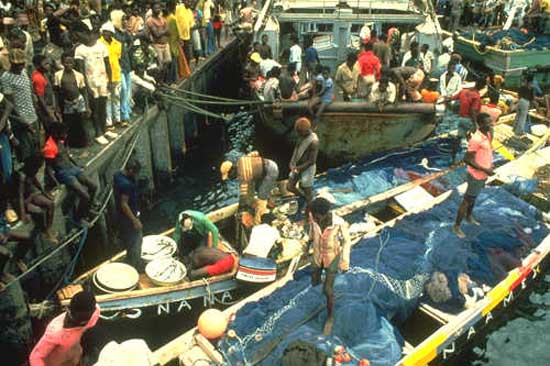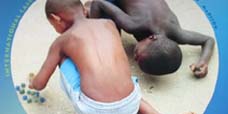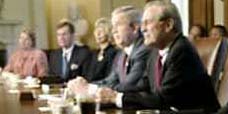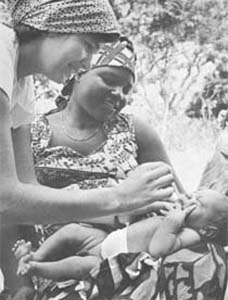February 23, 2005: Headlines: COS - Togo: Speaking Out: Roanoke: Togo RPCV J. Tyler Dickovick says As Togolese democracy goes, so may go Africa
Peace Corps Online:
Directory:
Togo:
Peace Corps Togo :
The Peace Corps in Togo:
February 23, 2005: Headlines: COS - Togo: Speaking Out: Roanoke: Togo RPCV J. Tyler Dickovick says As Togolese democracy goes, so may go Africa
Togo RPCV J. Tyler Dickovick says As Togolese democracy goes, so may go Africa

Togo RPCV J. Tyler Dickovick says As Togolese democracy goes, so may go Africa
As Togolese democracy goes, so may go Africa
J. Tyler Dickovick
±
Dickovick, an assistant professor of politics at Washington and Lee University, was a Peace Corps volunteer in Togo for two years in the mid-1990s.
Assaba Massougbodji screamed when she heard the news. The Washington and Lee University junior from the small African nation of Togo had never known any president other than Gnassingb Eyadema. When Eyadema died unexpectedly on Feb. 5, he left a power vacuum in a country whose political life he dominated for 38 years. Worldwide, only Fidel Castro had ruled longer. Eyadema's death, largely unnoticed in the United States, has set into motion events that could shape politics in Africa for years to come.
With his death, the question of succession arose. Togo's constitution specifies that the speaker of parliament presides on an interim basis and must call elections within 60 days. But Togo's ruling class - composed mainly of Eyadema's closest confidants and the military - is not known for constitutionality. The sycophantic parliament promptly amended the charter to allow Eyadema's son, Faure Gnassingb, to take charge.
In the Africa of the Cold War, the ritual of passing power to the son would have been the end of the story. Even a few years ago, the death of a president in the Democratic Republic of the Congo (DRC) triggered a transfer of power to his son. The response in Africa and in the international community was tepid at best.
But in Togo, things have gotten interesting. Togo's small size and political and economic insignificance make it a target for robust international pressure. The African Union - the continent's new grouping of heads of state - and several elected African leaders loudly condemned the action in Togo and called it by its name: a coup d'tat. Sensing that Africa's self-proclaimed (but yet unproven) commitment to democracy hung in the balance, the union demanded the return of constitutional order and the calling of free and fair elections. Togo's neighbors, not the United Nations and not the United States, took the lead in threatening sanctions, an unprecedented step in Africa.
Togo's history offers an ironic counterpoint to recent events. In 1963, Eyadema was a leader in post-colonial Africa's first coup. He and other young soldiers deposed and gunned down Togo's first elected president. That big news in the tiny country set the tone in Africa for decades. Military coups ravaged the continent incessantly.
Now, Togo may represent a turning point again, and this one for the better. Africa's fledgling democracies and elected leaders have not had the stature to alter events in the DRC or to unseat independence-era leaders such as Eyadema and Zimbabwe's increasingly psychotic Robert Mugabe. But over the last two weeks, they have shown more spine in resisting the perpetuation of dictatorship as old leaders age and die off.
It is possible that Africa will soon forget Togo, and Eyadema's son will seize power for the long haul. If so, more despair in Togo and more pessimism about Africa are in the cards. It is also possible, though, that Africa's democracies will gain a foothold. If so, they can establish precedents to which larger countries may soon be held accountable. If international pressures for democracy in Africa grow more effective in years to come, spare a thought for the tiny country where it all began. And wish it luck as it tries to overcome the last 38 years.
© Copyright 2005
When this story was posted in February 2005, this was on the front page of PCOL:
 | The Peace Corps Library
Peace Corps Online is proud to announce that the Peace Corps Library is now available online. With over 30,000 index entries in over 500 categories, this is the largest collection of Peace Corps related reference material in the world. From Acting to Zucchini, you can use the Main Index to find hundreds of stories about RPCVs who have your same interests, who served in your Country of Service, or who serve in your state. |
 | Make a call for the Peace Corps
PCOL is a strong supporter of the NPCA's National Day of Action and encourages every RPCV to spend ten minutes on Tuesday, March 1 making a call to your Representatives and ask them to support President Bush's budget proposal of $345 Million to expand the Peace Corps. Take our Poll: Click here to take our poll. We'll send out a reminder and have more details early next week. |
 | Peace Corps Calendar:Tempest in a Teapot?
Bulgarian writer Ognyan Georgiev has written a story which has made the front page of the newspaper "Telegraf" criticizing the photo selection for his country in the 2005 "Peace Corps Calendar" published by RPCVs of Madison, Wisconsin. RPCV Betsy Sergeant Snow, who submitted the photograph for the calendar, has published her reply. Read the stories and leave your comments. |
 | WWII participants became RPCVs
Read about two RPCVs who participated in World War II in very different ways long before there was a Peace Corps. Retired Rear Adm. Francis J. Thomas (RPCV Fiji), a decorated hero of the Japanese attack on Pearl Harbor, died Friday, Jan. 21, 2005 at 100. Mary Smeltzer (RPCV Botswana), 89, followed her Japanese students into WWII internment camps. We honor both RPCVs for their service. |
 | Bush's FY06 Budget for the Peace Corps
The White House is proposing $345 Million for the Peace Corps for FY06 - a $27.7 Million (8.7%) increase that would allow at least two new posts and maintain the existing number of volunteers at approximately 7,700. Bush's 2002 proposal to double the Peace Corps to 14,000 volunteers appears to have been forgotten. The proposed budget still needs to be approved by Congress. |
 | RPCVs mobilize support for Countries of Service
RPCV Groups mobilize to support their Countries of Service. Over 200 RPCVS have already applied to the Crisis Corps to provide Tsunami Recovery aid, RPCVs have written a letter urging President Bush and Congress to aid Democracy in Ukraine, and RPCVs are writing NBC about a recent episode of the "West Wing" and asking them to get their facts right about Turkey. |
 | Ask Not
As our country prepares for the inauguration of a President, we remember one of the greatest speeches of the 20th century and how his words inspired us. "And so, my fellow Americans: ask not what your country can do for you--ask what you can do for your country. My fellow citizens of the world: ask not what America will do for you, but what together we can do for the freedom of man." |
Read the stories and leave your comments.

Some postings on Peace Corps Online are provided to the individual members of this group without permission of the copyright owner for the non-profit purposes of criticism, comment, education, scholarship, and research under the "Fair Use" provisions of U.S. Government copyright laws and they may not be distributed further without permission of the copyright owner. Peace Corps Online does not vouch for the accuracy of the content of the postings, which is the sole responsibility of the copyright holder.
Story Source: Roanoke
This story has been posted in the following forums: : Headlines; COS - Togo; Speaking Out
PCOL17414
77
.










